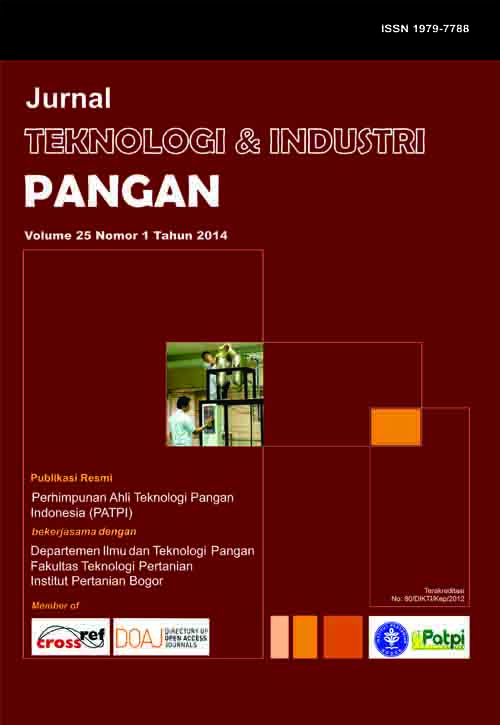PENGARUH KONSUMSI MINUMAN BEROKSIGEN TERHADAP INFLAMASI DAN KAPASITAS ANTIOKSIDAN PENDERITA PENYAKIT-PARU-OBSTRUKTIF-KRONIK (PPOK) [Influence of Oxygenated Water Consumption in Chronic-Obstructive-Pulmonary-Disease (COPD) Patients]
Abstract
PENGARUH KONSUMSI MINUMAN BEROKSIGEN TERHADAP INFLAMASI DAN KAPASITAS ANTIOKSIDAN PENDERITA PENYAKIT-PARU-OBSTRUKTIF-KRONIK (PPOK)
[Influence of Oxygenated Water Consumption in
Chronic-Obstructive-Pulmonary-Disease (COPD) Patients]
Fransiska Rungkat Zakaria1), Intan Nurul Azni2)*, Elvira Syamsir2), Amalia KM.3) dan Cholid Yamani3)
1)Departemen Ilmu dan Teknologi Pangan, Fakultas Teknologi Pertanian, Institut Pertanian Bogor, Bogor
2)Program Studi Ilmu Pangan, Fakultas Teknologi Pertanian, Institut Pertanian Bogor, Bogor
3) Klinik dr. Katili, Jl. Raya Dramaga, Bogor
Diterima 01 Agustus 2013 / Disetujui 05 Februari 2014
ABSTRACT
Chronic Obstructive Pulmonary Disease (COPD) is one of the leading cause of death in the world that represents an important public health problem. Oxygenated water is water added with high concentration of oxygen such that the oxygen concentration is higher than normal water. The objective of this study was to assess the influence of oxygenated water consumption on the alteration of proinflammatory cytokines (TNF-α, IL1-β, and IL6) and antioxidant capacity of COPD patients. Sixteen COPD patients were allowed to drink 385 mL oxygenated water two times a day for 21 days. The alteration of proinflammatory cytokines and antioxidant capacity are measured by comparing plasma concentration before and after intervention. The results suggest that oxygenated water consumption significantly reduce proinflammatory cytokines plasma (TNF-α, IL1-β, and IL6) at 5% significance level with 81.25% of respondents having lower TNF-α, 75% of respondents with lower IL-1β, and 62.25% of respondents having lower the IL-6 in plasma concentration after 21 days intervention. There were 43.75% of respondents with decreased antioxidant capacity concentration. However, it was not significant at the 5% level significance. Decrease in antioxidant capacity was probably a resulted from poordiet and drugs consumption during the intervention period.

